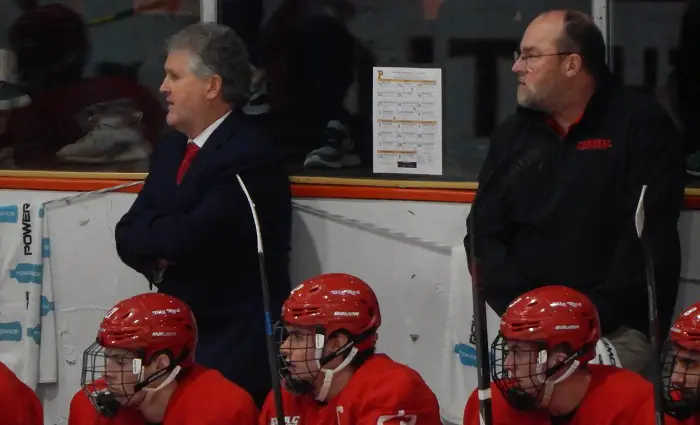
Sunday night was supposed to have been when Cornell would find out the next step in its hockey journey.
It was supposed to be the Big Red’s year, according to some quarters in the northeast and, perhaps, the nation. It sure looked like it through the end of February and the beginning of March.
The Big Red men’s hockey team had lost only two games all season heading into an ECAC Hockey men’s quarterfinal series against visiting Ivy League rival Princeton for March 13-15. Both of Cornell’s regular-season losses had come in ECAC play, to Dartmouth and Quinnipiac, the second one at the very end of January.
The Big Red didn’t lose to another opponent all year—unless you count the novel coronavirus (COVID-19), whose growing presence in North America just before St. Patrick’s Day ultimately put an untimely end to all NCAA winter and spring seasons for the calendar year.
It also ended Cornell’s possible run to a national title.
“Once conference teams started canceling, you figured there was a good chance it was going to snowball with the NCAA,” said longtime Cornell coach Mike Schafer, who just completed his 25th campaign at the helm of his alma mater.
Cornell ended with a 23-2-4 overall record, including a first-place finish in ECAC Hockey with a 18-2-2 mark and the program’s third consecutive Cleary Cup as regular-season league champions. It also concluded on a 9-0-0 tear, capped by a 5-1 win over second-place Clarkson on Feb. 29 at Cornell’s Lynah Rink that clinched first place.
That win also helped boost the Big Red back to a No. 1 national ranking in the polls, one that it still held by the end of the year, along with third place in the (usually) all-important Pairwise Rankings. The school’s women’s team was also ranked first in NCAA Division I by season’s end.
It was as far as Cornell would get, with the end coming far sooner than anyone expected, or wanted.
“We got off to a great start,” explained Schafer. “Other teams might have had injuries early on, and maybe their only way in (to the NCAAs) was to win their (conference) tournament.”
The Princeton series was to be originally played at Lynah Rink as scheduled, then played with no spectators present, and then not at all. The ECAC Hockey championship in Lake Placid, 40 years after the “Miracle on Ice” occurred in that venue, was subsequently canceled.
The NCAA regionals then fell by the wayside, and finally, there would be no Frozen Four appearance for Cornell, which would have been its first in 17 years, as it sought its first national title in exactly half a century.
“We held out hope, but once (conference) games were canceled, it didn’t look good,” recalled Schafer.
Thing really started to go awry on March 11, after the Big Red had enjoyed a first-round ECAC Hockey bye by virtue of finishing first in the league. After the Ivy League cancelled its postseason basketball tournament that day, though, the writing was on the wall, with hockey players and staff hearing various rumors with their own seasons hanging in the balance.
“You had a good idea that things were not going to take place,” admitted Schafer. “You work so hard to give yourself a chance, like everybody has done all year long, to put yourself in a position to be successful at the end of the year, like 60 teams do.”
Word then came down March 12 that there would be no more Cornell hockey this season, or any college hockey, as the NCAA pulled the proverbial plug on its winter and spring championships. With nothing concrete left to play for, the 2019-20 incarnation of the Big Red took the ice at Lynah Rink that day for the final time as a team.
“We had one last skate,” said Schafer. “We played shinny and enjoyed our last time on the ice together, then came off and talked. Things happened fast—classes canceled, students moving off-campus—and I’m glad we all got a chance to practice and hang out with each other one last time.”
The program’s three seniors — Noah Bauld, assistant captain Yanni Kaldis, and captain Jeff Malott — all participated in over 100 career games apiece in Carnelian Red and White, and recorded 90 wins in all as a group. They’ve also played in their last games in a Cornell uniform, and skated before the Lynah Faithful as active players for the final time ever in the Clarkson contest. The next time they appear in Ithaca, it’ll be as alumni.
“Our three seniors were a class that would have been in its fourth straight NCAA tournament, for the first time in Cornell history,” said Schafer. “They’re an outstanding class—not a big class, but great, quality people.”
March 22 was the night that the Big Red would have learned its NCAA seeding for this season, with Cornell possibly being seeded just three hours away in Albany. That night came and went, uneventfully, just like all North American sports have been experiencing since COVID-19 emerged.
“The most disappointing thing is that you want to give yourself a chance to capitalize,” added Schafer.
Some consolation has come in the form of individual awards that honored the Big Red’s collective success this season, one in which Cornell posted its best winning percentage (.867) since its undefeated, untied 29-0-0 NCAA title team of 1969-70. This year’s winning percentage also led all schools in NCAA Division I.
Junior forward Morgan Barron is a top 10 finalist for the Hobey Baker Memorial Award, and also became the seventh Cornell men’s hockey player to win ECAC Hockey Player of the Year. He was also named All-ECAC Hockey First Team along with Kaldis, who earned all-league honors all four of his years on the Big Red blueline. Barron also became the first Cornell forward to earn back-to-back All-ECAC Hockey first team honors since 1986 and 1987, when sharpshooter Joe Nieuwendyk did the same before he went on to win three Stanley Cups as a professional player.
Barron’s NHL rights are owned by the New York Rangers.
“They’ve kept in contact, but have been really good about letting me go about my daily business, of helping our team win championships,” said Barron in February.
This year’s shortened campaign also added both another Cleary Cup and Ivy League crown to Cornell’s already-storied trophy case.
Alex Green was named ECAC Hockey’s Best Defensive Defenseman, and he also copped All-ECAC Third Team accolades along with goaltender Matthew Galajda. In addition, over a half-dozen rookies saw substantial playing time for the Big Red this season, and as a group contributed more than 70 points to Cornell’s success.
“The biggest thing was how well our freshman transitioned, and without them we would not have had the season we did,” said Schafer. “They showed consistency through the end of the year, and they played well the whole course of the season.”
Schafer also became the first coach to claim the ECAC Hockey Tim Taylor Coach of the Year Award for a fifth time.
“You take that with a grain of salt,” admitted Schafer. “It’s a team award, and you never win it without living up to expectations at a very high level, or you do so much better than anyone thought.
“Our staff is great, and our players are outstanding, and they won the award,” he continued. “It’s more of a team award than anything else.”
That team environment has been put on hold for the time being, with COVID-19 still working its way around the world—and with no games being played at present, it’s been time for Schafer and company to take care of some housekeeping issues. The pandemic hasn’t hampered recruiting efforts, however.
“We always anticipated playing at this time, so it’s not affecting us,” said Schafer of not being out on the road, with current NCAA restrictions.
“There’s so much video (available, of players),” he said. “It’s a busy time of year, taking care of administrative details as a coach—player interviews, budgeting, planning, and everything else—and we’re knee deep in it.”
The road to the NCAAs will start again in September, and with most of the roster returning to Ithaca, the Big Red will be ready.
“It’s very special to be in a place like this,” freshman forward Jack Malone said last month. “It’s an atmosphere you can’t get anywhere else in college hockey, with the Lynah faithful, and it’s exciting to play in a place like this.”
Just not any more this season.


